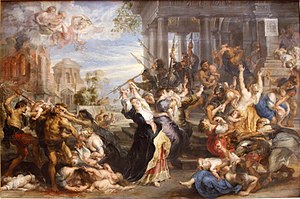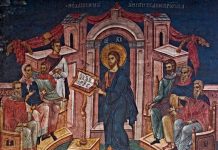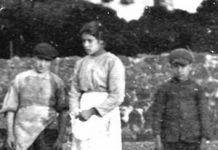The feast of the Holy Innocents, which we celebrate appropriately enough within the octave of Christmas, might seem a troubling commemoration at first glance. Remembering the wholesale slaughter of all the male children two years and under, in and around Bethlehem? Why would God permit such a sacrifice? Yet this feast signifies certain theological principles of which the Church does good to remind us.
The story is recounted by Saint Matthew at the beginning of his Gospel, when the Magi returned to their country ‘by another route’, to avoid revealing to Herod the identity and location of the Messiah, whom he wanted to destroy as a rival to his kingship. Herod, realizing he had been deceived, in his rage decided to have every male child under two years old in Bethlehem killed, just to be on the safe side. One sees an echo of this in the original Terminator film, when the Arnold-android-assassin goes back in time to kill the mother of the future hero, John Connor, who would go on to defeat him and the rest of the ‘machines’. Not knowing who the ‘real’ Sarah Connor was, the implacable terminating assassin decides to kill all the ‘Sarah Connors’ in the Los Angeles phonebook, one by one…
Sci-fi buffs of a certain age may recall that the Terminator was not successful, and neither was Herod, for Joseph was warned in a dream to take the child and His mother to Egypt, until after the death of heinous Herod.
What may puzzle, even scandalize, our secular minds is that the children had to suffer in the place of the Christ child, whose own far greater suffering lay three decades in the future.
Yet it was this vicarious suffering which made these Jewish innocents, martyrs. To be given that title, one must suffer in odium fidei, ‘in hatred of the faith’, which suffices in this case, with Herod’s hatred of the Christ whom he knew not. Every murder of a martyr is an attempt to suppress the truth, and quell the troubled conscience of a tyrant.
These Holy Innocents were not old enough to know this, and knew not, this side of their brief earthly lives, why they were being killed. Nor were they ‘Christians’ in any canonical sense of that term. They were not baptised, except by the blood of their offering, and the mark of their circumcision, which gave them a share in God’s covenant. Yet in heaven they are, now enjoying the beatific vision; we know not how many. Some exegetes say twenty; others, hundreds. (Some revisionists even deny their existence, with the whole story a myth, but that, dear reader, is a modernist heresy, for the Church has always taught that the Gospel stories convey the real historical truth).
What these Innocents also teach, without words, is that salvation is a gratuitous gift, one that God wills for all men. Although we do merit eternity congruently – that is, in some proportionate way – by our good works, we should keep in mind that even this ‘merit’ itself is itself a gift, and it is Christ Who pays almost all of the ‘price’ of our redemption. Beatitude far exceeds anything we can do, and is not something earned in strict justice, with the proviso that we who are of the age of reason must use what talents we are given well, and do nothing to block or obviate this gift by a grave and mortal sin, either of commission or even of omission (recall the rather sobering parable of the sheep and goats Matthew recounts towards the end of his Gospel).
As such, these youngest of saints also give us hope for the salvation of all those who shuffle off this mortal coil before the age of reason, and before they can make a moral choice. Such was the opinion of the International Theological Commission, an advisory body to the Magisterium, which in 2007 discussed the fate of unbaptized infants, ending on a note that we may indeed hope and trust in their salvation by ways known only to God, Who is not bound by His sacraments.
This is a necessary query, for we now have millions upon millions of children snuffed out by abortion – surgical, but, more so, the untold hidden numbers of chemical abortions in early pregnancy. Pope Saint John Paul II offers his thoughts on this tragedy in his 1995 encyclical Evangelium Vitae, writing to mothers who have had their children aborted, that after asking forgiveness of the Father through the ministry of the Church in the sacrament of Confession, “to the same Father and his mercy you can with sure hope entrust your child” (par. 99). (This is corroborated by the vision given to the abortionist Stojan Adasevic, who saw in his ‘dream’ Saint Thomas Aquinas in heaven, surrounded by all the children he had killed. Needless to say, Dr. Adasevic converted, and became an ardent pro-lifer).
We should not mitigate the pain in the death of the very young, which is a suffering, a deep privation, and, in the case of deliberate abortion and infanticide, a grave moral evil. God will demand an account of us all, for what we have done to His ‘little ones’. We should pray and repent for an end to the culture of death in all its forms. But the same God brings the greatest good out of even the greatest evil and suffering, for from the darkness, light shines forth.
So rejoice and be merrie this day in this festive season with these heavenly Holy Innocents, as we hope in the salvation of all infants, babies, children who have gone to the Father. It is we, grown old in our various sins and bad habits, who must regain and maintain some of their innocence. For as Someone once said, unless we become like children, we shall not inherit the kingdom of God. (Mt. 18:3)
And may all those children intercede for us. +










